On table building, emotion, and performance at Red Lens Acting Academy
On Wednesday 8 October I had the pleasure of attending one of the group acting classes that are run by the Red Lens acting company. In the span of a two-hour session, founder and instructor Shireenah Ingram led a session that, in focusing on acting as a collaborative endeavour in which scene partners feed off each other’s energy, brought the process into an attainable sphere. We started with warm ups that had the people in the room getting used to one another as a collective, leading into the main performance where we were paired up and fed off each other’s energy more than we relied on the script. This culminated in the performance of a short script focusing on aspects of comedy or drama.
Classes run in two six-week blocks, broken up by a break in the middle for half term, every Wednesday at the Birmingham Royal Ballet. Each session tends to focus on a particular theme. Ours was ‘emotional conditioning’ but previous examples included were, but not limited to, Authenticity, Listening, Characterisation and Voice. After taking the train in from Coventry, I joined the session a little late, finding everyone gathered in a circle in the middle of the studio as the warm-ups commenced. Acting’s definition is based on the ability to feign, to represent and to impersonate. As the class was open to all degrees of acting ability, Red Lens firmly stands as a creative programme that uses volunteers and coaches to implement change at the local, and national levels. Having non-actors work on those skills enables the students to embolden themselves, from presenting themselves with more confidence to communicating more assuredly.
In stressing the use of the diaphragm, Shireenah had us generating an internal source of energy to match the simultaneous movement occurring alongside – the collective sound and moments of connection being the ultimate end goal, our bodies as vessels for emotional expression
The first half of the class was focused on using our bodies as tools to generate energy, which later would be used to emulate the emotion evoked through a script. The first exercise was walking around the studio in random directions, conscious of breath control and making passing moments of eye contact. Moving around the room at the start of the practice, concerned only with ourselves, and then being deliberately brought into moments of human connection, set this apart from a purely physical warm-up. This then was elevated by having us maintain a humming sound on every exhale. In stressing the use of the diaphragm, Shireenah had us generating an internal source of energy to match the simultaneous movement occurring alongside – the collective sound and moments of connection being the ultimate end goal, our bodies as vessels for emotional expression.
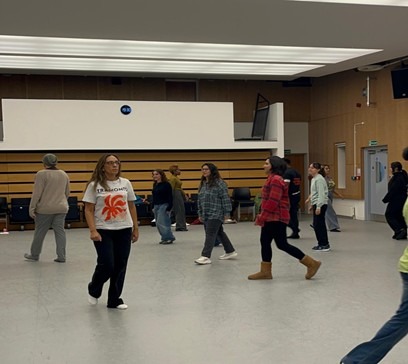
The second exercise built on that initial expression but fostered a much more intimate dynamic. The group was split in half and lined up facing each other in pairs. The point of this exercise was to take in the explicit details that you would typically disregard when in dialogue to another person. Acting tends to demand a believable type of authenticity, and therefore this was the best, if startlingly and purposefully awkward, exercise to have the class to complete. In counting down from twenty we were encouraged to look at everything from how the person held themselves (were they anxious? Did they have any ticks?) to the style of clothing they were wearing (fashionable? Unfashionable? Old? New?). I caught myself sinking into the instructions of the task – eye contact was held, my impulse to start laughing dissipating. I began to notice details like the particular green of my partner’s shirt and a stray eyelash on her cheek. It was a beautiful way to remind the class of the micro-relationship one must build when entering the realm of acting, this was the person who would matter the most to me from this moment, their energy needed to be matched, emotions considered, reactions provoked.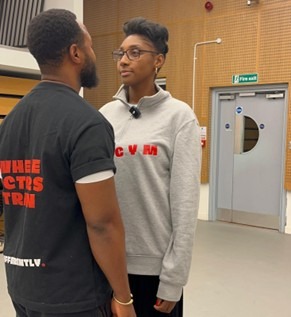
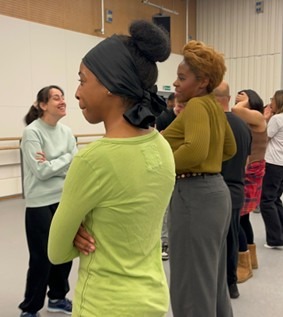
The culmination of all this prep was the performance of a short script given to us, with either a dramatic or comedic focus. We were to set up our imagined physical setting (place furniture, decide weather conditions etc.) and then perform the scene with our partner for the entire workshop to receive individual feedback. From that point onwards we were not actors anymore, instead becoming Ethan, a dejected man and Maya, the wronged lover. As I quickly came to understand, it is much harder to get the audience to genuinely laugh than it is to make them feel the intensity of a dramatic scene. As we went around the group seeing each pair’s work, the best portrayals focused on the atmosphere their partner was generating – Shireenah’s feedback reminded us to draw back to the physical aspects of the performance rather than simply focusing on what was said and how we were saying it. Personally, the stand out performance was staged between actors Thomas and Miranda, who tackled the scene through what is beautifully left unsaid, letting the audience sit in a silence that speaks to the tension between these characters, finally broken through the dialogue, “Maya….Don’t say my name like it still belongs to you”. The reason this performance stands out is that when Shireenah stripped away their dialogue (letting the pair repeat the scene with Thomas only calling Maya’s name) the simplicity spoke to the unspoken intimacy in this relationship.
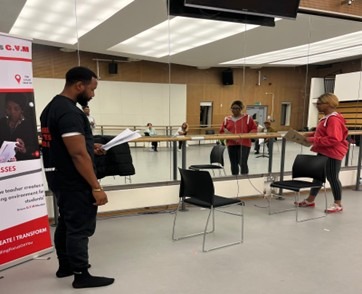
I had the wonderful opportunity to interview founder and instructor Shireenah Ingram;
What lead to the founding of the Red lens acting GYM and what were you looking for in a program like this?
I realised as an actor coming back to Birmingham from London after lockdown that there wasn’t anything in terms of having a place to play. It started as a place for professional actors to train but I quickly realised that it was people who were non-actors that would benefit most. So now we offer classes to non-actors, beginners, people looking to refresh their skills and that community has now become the driving force.
You describe how Red Lens, and the purpose behind it, is about pulling focus back onto your students work, what does that look like in everyday practice?
My purpose in life is to entertain, but it’s also to motivate. Through coaching and supporting people through their journey – I get to do both of those things. When I say pulling focus, my skill is in seeing the critiques they obviously can’t see themselves and be that lens for them, “like did you notice you do that with your leg? or did you notice you fidget with your arm?”. The USP of what we do here is that it’s not just a general acting class where we just learn theory, it’s practical and that’s when things are going to show up. For example, putting people in the spotlight and getting them to perform gives the chance for everyone to show something and work on something just like you would at the gym, which is why it’s called the actor’s G.Y.M
We are entering an era where a general devaluing of the arts is taking place; academics are being cut, lack of funding is more prevalent than ever, what has been the most pressing thing you’ve witnessed about this current climate?
As a teacher in a post 16 academy, young people and students in school come in and they commonly say “oh drama has been cut from our curriculum we don’t even have it on our course anymore” and I’m like wow, drama was the one thing in school that made me realise I want a career in performance. I am also a board member here at Birmingham Royal Ballet and talks of other institutions having their funding cut saddens me, the creative practice in which one entertains audiences is also an avenue of creative expression for the artists as well. So personally, if I could be a part of a small part of creating a platform and a space that allows people to practice that creativity then I’m all for that. One of the things that we’ve had to do this year, because we realised, we can’t do it on our own, was apply for funding. So, we went to the Arts Council and said can you fund this project so we can give some of these actors who have never performed before their first paid professional credit on stage and we did it! We pulled off this full staged production and took it on tour and I’m like wow I did that. It was called false accounts and it was based on the post office scandal, and gave professional opportunity for people in the cast to practice self-taping, auditioning and it has also made us realise that we want to do more talent development — so if funding is being cut for opportunities then we need to be the providers for that, so that’s our next phase.
As a woman of colour, what we see in terms of representation specially as a Black woman is that typically you are only allowed to portray a specific type of strength, what has Red Lens allowed to present in terms of questions of misrepresentation?
I mean it sounds really weird, but I forget sometimes that I am in fact a ‘Black woman’ and how I could be perceived as that, or just that I guess. The community that we are building (at Red Lens) is just so diverse, when I’m looking at the some other institutions I’m wondering do they have the mix of what we are building here, and for me I’m so proud that we can be a champion for that. The thing for me when I was growing up was that I didn’t have someone to say “oh I want to do it like her, or can she show me that path”. No one in my family does anything creative so I feel like a pioneer in this, and I still feel as though I can’t see anyone doing what I’m doing and I remember when I was first setting up the business it felt so difficult to even get it off the ground. I have this saying that has stuck with me that was like “If no one is going to make room for you at the table, make your own table” and I feel like that is what I’ve done. And this table is growing, the people and the community are growing and if there is one thing I can say I live by is just you have to be what you can’t see, so that the young versions of people like me can grow up and say they can do it too.
End of Interview
Whilst I think I’ve given an objective breakdown of the format and practical goings-on at the Red Lens, the unspoken magic of the class is the community that Red Lens has and continues to cultivate. Each activity had laughter bubbling up not too far behind it. Each critique is personal and delivered in a way that gets the actors to hone their craft, and the group genuinely cares about progressing together as a collective. In the one session I attended I was equally welcomed and put to work, everyone is serious about what they create in these classes in a way that pushes you to do the same — even if you haven’t acted since your year 6 year Nativity production. I am excited to see the future of the company as it continues to highlight diverse voices and build a space where everyone can comfortably pull up a seat.
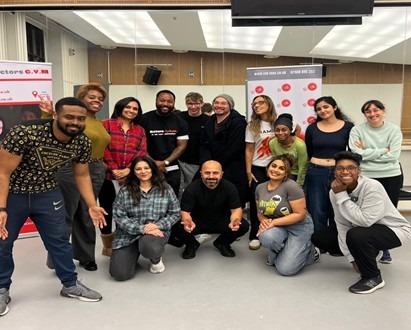
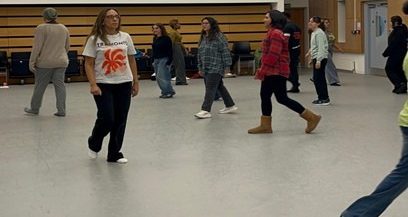
Comments (1)
tuff